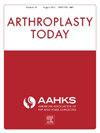“Bilateral Capnocytophaga Canimorsus Periprosthetic Joint Infections in an Immunocompromised Patient: A Case Report and Literature Review”
IF 1.5
Q3 ORTHOPEDICS
引用次数: 0
Abstract
A 63-year-old dog owner with bilateral total knee arthroplasties developed periprosthetic joint infections bilaterally due to Capnocytophaga canimorsus (C canimorsus), a bacterium commonly found in the saliva of dogs and cats. Aerobic and anaerobic cultures from explant surgery were negative; however, bacterial 16S polymerase chain reaction followed by sequencing of the amplified product identified C canimorsus in both knees. Treatment was successful with bilateral explant, antibiotic spacers, intravenous antibiotics, and reimplantation. C canimorsus is a rare cause of prostheses infections. As total knee arthroplasty prevalence increases, infections will also increase. Treatment is best provided with collaboration among orthopaedic surgeons, infectious disease specialists, and pharmacists.
求助全文
约1分钟内获得全文
求助全文
来源期刊

Arthroplasty Today
Medicine-Surgery
CiteScore
2.90
自引率
0.00%
发文量
258
审稿时长
40 weeks
期刊介绍:
Arthroplasty Today is a companion journal to the Journal of Arthroplasty. The journal Arthroplasty Today brings together the clinical and scientific foundations for joint replacement of the hip and knee in an open-access, online format. Arthroplasty Today solicits manuscripts of the highest quality from all areas of scientific endeavor that relate to joint replacement or the treatment of its complications, including those dealing with patient outcomes, economic and policy issues, prosthetic design, biomechanics, biomaterials, and biologic response to arthroplasty. The journal focuses on case reports. It is the purpose of Arthroplasty Today to present material to practicing orthopaedic surgeons that will keep them abreast of developments in the field, prove useful in the care of patients, and aid in understanding the scientific foundation of this subspecialty area of joint replacement. The international members of the Editorial Board provide a worldwide perspective for the journal''s area of interest. Their participation ensures that each issue of Arthroplasty Today provides the reader with timely, peer-reviewed articles of the highest quality.
 求助内容:
求助内容: 应助结果提醒方式:
应助结果提醒方式:


